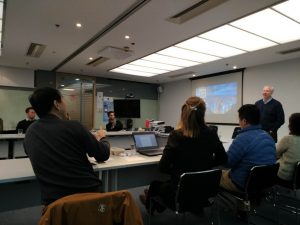Yesterday, in collaboration with the Shanghai European Chamber of Commerce, Collective Responsibility hosted a Lunch and Learn event to help increase awareness about waste and waste management in China.
An interactive session, that ended with practical tips for individuals and companies to take to reduce their waste footprint, Rich Brubaker started the session provide insights from our research and work with waste.
Richard opened the session by talking about urbanization and the motivations behind action when it comes to sustainability issues. In Shanghai for example, looking out the window and struggling to see buildings due to smog, or taking a walk by a park and seeing masked children playing are pretty strong reasons to realize that there is something seriously wrong happening.
The evident issue is pollution, but how did we get here?
One of the answers to this question is urbanization, but this is not to say that urbanization is bad thing. In fact, urban development is tightly linked to sustainability, which is good, but the problem arises when urbanization happens faster than urban systems can adapt.
After acknowledging the fact that the city will just continue to grow and become more densely populated, Rich continued to explain that being pragmatic is key. In reality, that it is a given billions of urban consumers will keep demanding products and services, but the crucial element on this equation is not what, but rather how these commodities are demanded and delivered, and the need to focus on delivering an efficient/ sustainable economy to 7 billion urban consumers is a goal to be set.

To help participants understand the size of the challenge, Richard’s presentation centered around the challenges that cities face managing their waste, the challenge that the country has feeding its people, and the need to address food waste both on the farm and in the office.
All issues that present major challenges, that will likely continue to grow in size and scale, Rich proceeded to explain that the good thing about these challenges were that they were growing visible and tangible to local communities, and that with this tangibility, opportunities for innovators and entrepreneurs wanting to come up with solutions were coming to scale.
For those participants that were not looking to move their organization, or drive their own innovative idea, Rich provided a few ways for participants to cut their own daily waste:
- Buy in store and not online.
- Buy/ order just the right amount of food and use reusable bags
- Bring your own mug to Starbucks, and say no to food delivery
- Bring your own toiletries when traveling, and when staying at a hotel use the ‘do not disturb’ sign to avoid getting a new set of sheets and towels every day
- Stop printing
For us, this was a great opportunity to engage with the community, and we greatly appreciate the opportunity to work with the European Chamber to engage their membership.
Should you want to arrange a lunch and learn at your office, or for a group of peers, please reach out to us at [email protected] to learn more.
For more insights on the informal VS formal waste system, you can download our report to learn more:
Informal Waste – Sustainability Insights – Collective Responsibility
Report written by Karen Saenz
